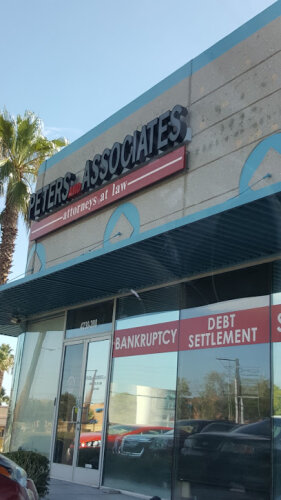Best Foreclosure Lawyers in Las Vegas
Share your needs with us, get contacted by law firms.
Free. Takes 2 min.
Free Guide to Hiring a Real Estate Lawyer
List of the best lawyers in Las Vegas, United States
About Foreclosure Law in Las Vegas, United States
Foreclosure is the legal process lenders use to recover the balance of a loan when a borrower defaults. In Las Vegas, which is in Clark County, Nevada, most residential foreclosures proceed under state law for deeds of trust by nonjudicial trustee sale. That means a trustee appointed in the deed of trust can sell the property without a court case after certain notices and waiting periods are met. Foreclosure affects not only the ownership of the property but also credit, possible deficiency liability, and the right to occupy the home. Because federal rules, state statutes, loan documents, and servicer procedures all interact, outcomes and options will vary by case.
Why You May Need a Lawyer
Foreclosure matters can be complex and fast-moving. People commonly need a lawyer for these reasons:
- To evaluate whether the lender followed required notice and procedural steps. Lenders and servicers must comply with state statutes and the terms of the deed of trust.
- To investigate possible wrongful or defective foreclosure, fraud, or servicing errors such as dual tracking, misapplied payments, or improper assignment of the loan.
- To negotiate loss mitigation options - for example, loan modification, repayment plan, forbearance, short sale, or deed in lieu - and to understand long-term consequences of each option.
- To defend or respond to a deficiency action or other civil suits related to the mortgage or property.
- To handle related issues like HOA foreclosure claims, bankruptcy filings that may stop the sale temporarily, or eviction proceedings after a sale.
- To represent you at hearings, mediation, or to obtain court relief when a judicial remedy is required.
Local Laws Overview
Key local and state law points to be aware of in Las Vegas and Nevada generally include:
- Nonjudicial foreclosure is the common route. Most Nevada mortgages are secured by deeds of trust that authorize a trustee sale. The trustee records a notice of breach and election to sell, followed by a public sale if default is not cured.
- Notice and timing requirements. Nevada law requires certain notices be recorded and provided to the borrower and to certain interested parties before a trustee sale. There are statutory waiting periods between the notice and the sale. Because timelines matter for cure rights and procedural defects, pay attention to deadlines on your notices.
- Reinstatement and cure rights. In many cases a borrower can reinstate the loan by paying past due amounts and certain costs prior to the trustee sale. Rights to reinstate vary depending on the loan documents and whether the lender has elected a particular remedy.
- Deficiency claims. Whether a lender can seek a deficiency judgment after a foreclosure depends on the loan, the property type, and the foreclosure method used. Some residential situations provide limits or special procedures; other cases may allow the lender to pursue a deficiency after sale.
- HOA foreclosures. Homeowners associations have separate lien and foreclosure rights for unpaid assessments. HOA foreclosures can follow different procedures and can affect ownership and rights to collect amounts due.
- Federal and state consumer protections. Federal rules and state statutes impose disclosure, servicing, and fair-practice obligations for loan servicers. Programs for federally-backed loans may require servicers to offer loss mitigation options before sale.
- Bankruptcy and automatic stay. Filing bankruptcy can create an automatic stay that temporarily halts most foreclosure actions. Bankruptcy has its own consequences and timelines and should be discussed with a knowledgeable attorney.
Frequently Asked Questions
What starts the foreclosure process in Las Vegas?
Foreclosure usually begins when a borrower misses payments and the lender or servicer records a notice of default or a notice of breach and election to sell under the deed of trust. This triggers statutory notice requirements and starts the pre-sale timeline. The exact documents and timing can vary with loan type and servicer practices.
How long will the foreclosure take?
There is no single answer. Nonjudicial trustee sales are subject to state notice and waiting periods that often take several months from the first missed payment to a sale. If the borrower files bankruptcy, pursues loan modification, or the lender initiates judicial foreclosure, the timeline can be extended significantly.
Can I stop a trustee sale?
Often a sale can be stopped temporarily by curing the default - paying past due amounts plus allowable fees - or by negotiating a workout with the servicer. Filing for bankruptcy creates an automatic stay that pauses foreclosure while the court considers the bankruptcy petition. A court action or a successful challenge to the foreclosure procedures can also stop a sale. Because timing is critical, act quickly and consult counsel.
What is the difference between a trustee sale and a sheriff sale?
A trustee sale is a nonjudicial public auction conducted under a deed of trust by a trustee. A sheriff sale typically results from a court judgment in a judicial foreclosure or other court-ordered enforcement. Nevada commonly uses trustee sales for mortgages secured by deeds of trust, so trustee sales are more common than sheriff sales for standard mortgage foreclosures.
Can the lender keep coming after me for the unpaid balance after a foreclosure?
It depends. Lenders may seek a deficiency judgment for the difference between the loan balance and the foreclosure sale price in some circumstances. Whether they can do so and the procedure to obtain such a judgment varies by loan type and statutory rules. Some residential loans have statutory protections or particular remedies that limit deficiency recovery. Talk to an attorney about potential deficiency exposure in your case.
What happens to occupants after the foreclosure sale?
After the trustee sale, the purchaser obtains title and the former owner may receive a notice to vacate, or the new owner may pursue an unlawful detainer or eviction proceeding if occupants do not leave voluntarily. State and local rules govern possession and eviction procedures. There are often short windows to remain or to negotiate a move-out agreement.
Are there free or low-cost help options in Las Vegas?
Yes. HUD-approved housing counseling agencies provide loss mitigation counseling and can help you understand options like loan modification, forbearance, or short sale. Nevada Legal Services and local nonprofit organizations may offer free or sliding-scale legal help for eligible low-income homeowners. The Nevada State Bar and local bar associations may also provide lawyer referral services or free consultations.
What documents should I gather if I need help?
Collect loan documents and the deed of trust, recent mortgage statements, all notices from the lender or trustee, payment records, your written communications with the servicer, property tax bills, HOA statements if applicable, and any court filings such as notices of sale. Organized documents make it easier for a lawyer or counselor to evaluate your situation quickly.
Can I negotiate a short sale or deed in lieu of foreclosure?
Yes, those are common alternatives to foreclosure. A short sale requires lender approval to sell the property for less than the debt. A deed in lieu involves voluntarily transferring title to the lender to avoid foreclosure. Both have pros and cons - including potential tax, credit, and deficiency consequences - and should be negotiated with legal and tax advice.
Should I respond to every notice and communicate with the lender?
Yes. Do not ignore notices. Responding and keeping written records of all communications is important. Ask the servicer for a written statement of the amount needed to reinstate, and request loss mitigation applications if you are seeking modification. At the same time, be cautious about signing any document without understanding its consequences - consult an attorney before signing deed transfers, waivers, or short sale agreements.
Additional Resources
Consider these local and statewide resources when seeking help:
- HUD-approved housing counseling agencies - for loss mitigation counseling and help with paperwork.
- Nevada Legal Services and local legal aid organizations - for free or low-cost legal help based on eligibility.
- Nevada State Bar - for lawyer referral services and information about finding a qualified foreclosure or bankruptcy attorney.
- Clark County Recorder and Clerk offices - to obtain recorded notices, deeds, and sale information.
- Nevada Attorney General Consumer Protection - for complaints about unfair or deceptive practices by lenders or servicers.
- HUD and U.S. Department of Housing and Urban Development publications - for general federal mortgage servicing and foreclosure-help guidance.
Next Steps
If you are facing foreclosure in Las Vegas, take these practical next steps:
- Read all notices carefully and note deadlines. Acting quickly can preserve legal rights and options.
- Gather and organize documents related to your loan, payments, and all correspondence with the lender or servicer.
- Contact a HUD-approved housing counselor to discuss loss mitigation options and get help completing paperwork.
- Consult an attorney experienced in Nevada foreclosure, consumer loan servicing, and bankruptcy if you believe there are procedural defects, lender errors, or complex options to consider. Use the Nevada State Bar or local lawyer referral services to find counsel.
- Avoid signing documents that you do not fully understand without legal advice. Consider documented settlement offers in writing and get clear terms about deficiency waivers and credit impact.
- If you decide you cannot keep the home, explore short sale or deed-in-lieu options and understand their impact on credit, taxes, and any deficiency exposure.
Facing foreclosure is stressful, but timely action, professional advice, and organized documentation improve the chances of finding a workable outcome. If you are uncertain where to start, a housing counselor or an initial consultation with a local foreclosure attorney is a practical first step.
Lawzana helps you find the best lawyers and law firms in Las Vegas through a curated and pre-screened list of qualified legal professionals. Our platform offers rankings and detailed profiles of attorneys and law firms, allowing you to compare based on practice areas, including Foreclosure, experience, and client feedback.
Each profile includes a description of the firm's areas of practice, client reviews, team members and partners, year of establishment, spoken languages, office locations, contact information, social media presence, and any published articles or resources. Most firms on our platform speak English and are experienced in both local and international legal matters.
Get a quote from top-rated law firms in Las Vegas, United States — quickly, securely, and without unnecessary hassle.
Disclaimer:
The information provided on this page is for general informational purposes only and does not constitute legal advice. While we strive to ensure the accuracy and relevance of the content, legal information may change over time, and interpretations of the law can vary. You should always consult with a qualified legal professional for advice specific to your situation.
We disclaim all liability for actions taken or not taken based on the content of this page. If you believe any information is incorrect or outdated, please contact us, and we will review and update it where appropriate.











